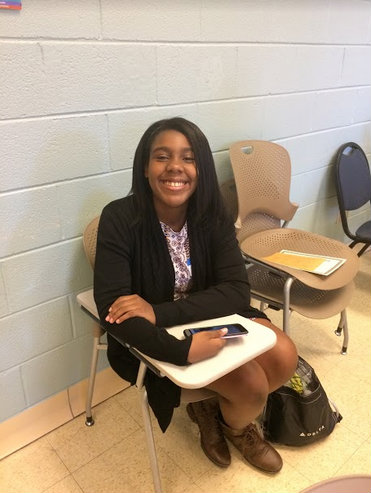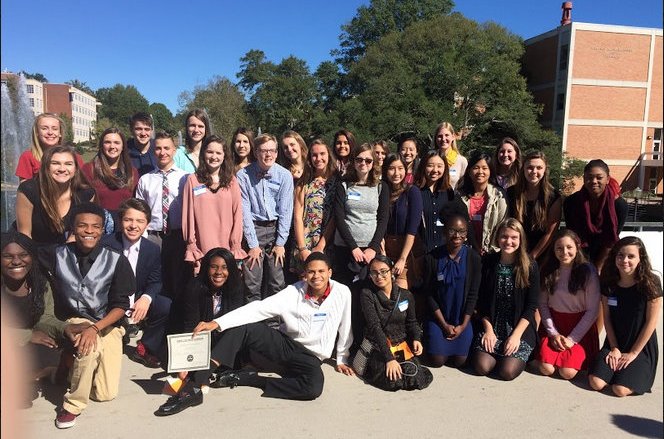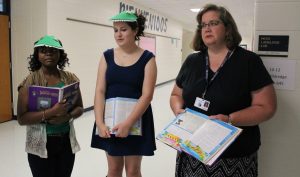Students reap roaring results at Clemson with prime preparation
All 33 of Starr’s Mill competitors pose smiling on Clemson University’s campus. The students competed in four different languages (French, German, Spanish, American Sign Language) out of a total nine (Chinese, Italian, Japanese, Latin, Russian). This was the 44th Annual Declamation Contest and five-year director Su-i Chen said that she is “always so proud of our young generation’s recognition of the importance of learning a modern language to reach out to the whole world.”
October 30, 2016
It’s a cold October morning, when over 100 students from Fayette County meet at the LaFayette Education Center ready to take the two-and-a-half hour bus ride to Clemson University. Once they arrive, they check in and prepare to recite their poem to a panel of judges.
Over the past 15 years, the Starr’s Mill High School world language department has taken its most dedicated and motivated world language students to Clemson University’s Annual Declamation Contest. This year, the Mill took 33 students to compete against 27 different schools in four of nine languages, including French, German, Spanish, and American Sign Language. Out of the five schools in Fayette County, Starr’s Mill was the “only school who also had four ASL students participate [in the competition],” French teacher Marie Scott said. The Mill participated in 36 different events and won 30 awards.
This year’s award recipients included:
- American Sign Language – senior Claire Mossman – first place
- American Sign Language – senior Jennifer Bradshaw – second place
- American Sign Language – senior Zaria Sweeting – third place
- German III – senior Kayla Christ – second place
- German IV – senior Madison Hagen – first place
- German (Native) – senior Tim Hahn – first place
- French I – freshman Bianka Destin – first place
- French I – freshman Rommy Sierra – first place
- French I – freshman Sarah Goins – second place
- French I – freshman Marina Foster – second place
- French II – sophomore Emma Posey – first place
- French II – sophomore Samuel Navarro Michel – second place
- French III – senior Madison Hagen – second place
- French III – junior Emily Treon – third place
- French IV – senior Madeleine Childress – first place
- French IV – senior Tim Hahn – first place
- French IV – senior Brian Dixon – second place
- French IV – senior Oluwatofunmi Bamiro – second place
- Spanish II – sophomore Erin Pham – first place
- Spanish II – sophomore Saijleen Chawla – first place
- Spanish II – freshman Jilliana Magat – first place
- Spanish II – freshman Virginia Jackson – second place
- Spanish II – freshman Alexander Sobczak – third place
- Spanish II – freshman Caroline Carle – third place
- Spanish II – freshman Yukimi Ueda – third place
- Spanish IIA – freshman Hannah Yokosawa – second place
- Spanish III – junior Alayna Burdekin – first place
- Spanish III – sophomore Jacob Just-Buddy – first place
- Spanish III – senior Derico Blalock – third place
- Spanish IVB – junior Ximena Bejarano – first place
The success that the Starr’s Mill squad saw is due to their preparation.
The first step in the prep process began with an audition. Generally, world language teachers have their students memorize one mandatory poem to decide who will compete at Clemson. Typically, students who are in level one or two classes have a little over a month to learn and memorize their poem before reciting them in front of their peers. Students “start memorizing in early September [and] we practice the poem together every day,” Scott said.
The students’ first performance in front of the class helps Scott and the other world language teachers determine who competes in each language level.
Once the students who memorized and recited the standard poem best were chosen for Clemson, Spanish teacher Shayne Thompson started prepping her students right away. “My students would come in the mornings, after school, and during their lunch period [for practice]. I also would have ‘poem checks’, where I’d take a student out into the hall one at a time to see their progress,” Thompson said.
This was Thompson’s first year going to Clemson with the Mill, but she previously went with Griffin High, where she taught Spanish for six years. Although this is her first year as a Starr’s Mill team member, she couldn’t have been more excited for the “kids [to have] a good time and show [that] all their hard work paid off,” Thompson said.
The hard work that competitors put in each week to prepare was time-consuming but proved their dedication.
“I went into Madame [Marie] Scott’s room at least twice a week to practice. I also practiced at home, in front of my parents, and by myself,” junior Emily Treon said. As a French level 3 competitor, this time around, Treon said she felt completely comfortable for the audition.
In the other two years she has competed, Treon has always placed. “Freshman year, I won second place and sophomore year I won first,” Treon said. This year, however, Treon was nervous, mainly because she wanted to maintain her winning streak.
Senior Tofunmi Bamiro took similar steps. “I stayed after school twice a week for over a month, saying my poems to Madame Scott, so she could critique them,” Bamiro said. For the standardized poem, Bamiro had to memorize “L’Albatross,” by Charles Baudelaire and “Harmonie du Soir,” by the same poet. “‘Harmonie du Soir’ was the most difficult to learn, and ‘L’Albatross’ was my favorite,” Bamiro said.

Starr’s Mill competitor waits in a classroom in Daniel Hall to recite her poem in front of a panel of judges.
With this year as her fourth and final year competing, Bamiro always thought that going to Clemson “was a great way to show off our language skills and see other students who are also interested in language.”
As a student that appreciates silent just as much as spoken language, one of the four ASL competitors, senior Jennifer Bradshaw, said that it “was hard competing in ASL because it’s not like you can memorize words. Instead, you memorize gestures. The hardest part was memorizing each sign and how many times to [repeat that same sign].”
However, as a student in the second year ASL class, Bradshaw said that it made “[memorizing] easier.”
Bradshaw and Bamiro weren’t the only ones to face challenges in preparing for the competition.
Director of the 44th Annual Declamation Contest, Su-I Chen said that finalizing the program was the largest challenge. The contest starts with “collecting the registration forms from about 30 to 40 schools, confirming the registrations, waiting for the fees to complete the registration, [and placing] around 450 to 500 students in about 70 different contests,” Chen said. Placing the competitors into different contests is the most complex step.
The next step is to share the programs with the participating schools, and “receive requests to make changes on the program that can easily affect the program,” Chen said.
At any point in the process however, “anything can happen, including delays and errors, and it takes time and attention to make it right. It amounts to be like a second full-time job from September till the end of the event,” Chen said. This year’s prep began in February.
As her fifth year directing, the stress that Chen experiences in finalizing the contest each year is worth it. “It always touches me so much to know that there are hardworking high schoolers somewhere out there working very hard to come to be part of the contest. They work hard to learn the language, to memorize the poems, and to travel all the way to Clemson just to be part of it,” Chen said.
Even if a competitor didn’t place, the hard work and weeks of preparation put in is something to celebrate in itself. “All participants should be congratulated, because they are here, they try hard, and they [made] their efforts worthwhile. The entire experience is so rewarding to me and that’s why there is no doubt that we will keep doing this for our young generations [to come],” Chen said.









Su-I Chen • Nov 3, 2016 at 10:26 am
Thank you so much for sharing the experience with us. It’s great to know how the students and the teachers prepare for the contest while faculty and staff of the department of languages at Clemson are getting things ready to welcome you.See you next year!